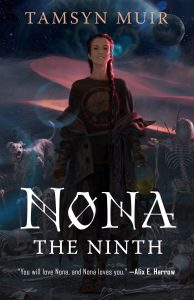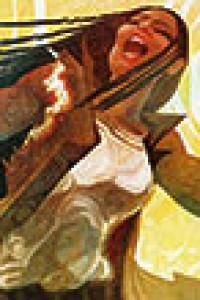The Year in Review 2022 by Tim Pratt
 I read a lot of science fiction, fantasy, and horror in 2022, because I am (yet again) serving on an award jury, and my overall impression is that the field is healthier than ever, with standout work by established authors, impressive new writers breaking in, and stories from an ever-expanding chorus of voices capable of speaking to a vast range of human experience. I went through my long list of favorites for the year and picked ten titles that give a nice sense of the breadth of quality work in the genre.
I read a lot of science fiction, fantasy, and horror in 2022, because I am (yet again) serving on an award jury, and my overall impression is that the field is healthier than ever, with standout work by established authors, impressive new writers breaking in, and stories from an ever-expanding chorus of voices capable of speaking to a vast range of human experience. I went through my long list of favorites for the year and picked ten titles that give a nice sense of the breadth of quality work in the genre.
Dead Collections by Isaac Fellman is simply excellent. It’s about a transmasculine vampire archivist dealing with the difficulties of living with a thirst for blood and an extreme aversion to sunlight… and the even greater difficulties of falling in love. The romantic interest is the widow of an author whose papers were recently acquired for the narrator’s archive, adding a delicious layer of complexity to the proceedings. The novel is smart and thorny, complicated and sexy, and wonderfully weird.
The Book of the Most Precious Substance by Sarah Gran might be my favorite book of the year (see below for details on my ambivalence). Gran is best known for the Claire DeWitt mysteries, which hint at the magical, but this title is more explicitly fantastic. The narrator is a once-promising writer, now barely scraping a living as a book dealer while taking care of her formerly brilliant but now basically catatonic partner, a victim of early-onset cognitive decline. She’s hired to track down the titular volume of ritual magic for a wealthy collector, and embarks on the quest with the help of a fellow bookseller. Their journey that takes them to very dark places, and Gran is at her most caustic, brutal, and wise here.
Spear by Nicola Griffith is the other contender for my favorite book of the year. It’s a genderbent, queer take on the legends of Sir Percival from the tales of King Arthur, blending familiar Arthurian elements with inspired takes on Irish and Welsh mythology. The main character, Peretur, grew up in isolation with her strange mother, and when she sets out to seek her fortune, she discovers secrets about her past, and about the nature of reality. It’s an absolute tour-de-force of a novel – it made me feel all the feelings at various points – and casts the whole Matter of Britain in a new light.
Sea of Tranquility by Emily St. John Mandel is character-driven literary weirdness, a loose sequel to The Glass Hotel, but more overtly speculative than the earlier (also excellent) volume. Sea of Tranquility ranges across time and space to explore an enthralling cast of characters, this time sprawling from Vancouver Island in 1912 to near-future Earth to a moon colony centuries later. Gradually discovering the connections between those timelines is delightful and heartbreaking, and the writing is simply magnificent, which is no surprise coming from Mandel.
I’ve read many things by legendary author Alan Moore, but I hadn’t read much of his non-comics writing before, so I wasn’t sure what to expect when I picked up Illuminations. Most of his short prose work is collected here, and it’s an amazing suite of tales, with no two stories alike. There’s secondary-world fantasy, postapocalyptic satire, ghostly horror, and formal literary experimentation, among other things, and every piece is great. The highlight is a complete short novel, ‘‘What We Can Know About Thunderman’’ – it’s a bawdy, funny, disturbing, over-the-top version of the history of American comic books, and it concludes on a dizzying note of transcendence (or maybe derangement; I go back and forth).
 I enjoyed Gideon the Ninth by Tamsyn Muir and loved the ambition of Harrow the Ninth, even if I spent a lot of time confused about what was going on in both. The third volume of the Locked Tomb series, Nona the Ninth, is my favorite of the bunch, though, and despite the inevitable dark subject matter (war, dead people, and the looming threat of vengeful planet-sized monsters), it’s such a fun book. Nona is the most lovable of the titular protagonists (even more than Gideon, for me), and there’s so much joyfulness throughout. We also finally get a glimpse of the daily lives of people in this universe who aren’t incredibly powerful aristocratic murder magicians, along with some welcome backstory about other major characters in the series. Nona is one of those books where you just want to hang out with the main characters, and I was sad when it ended. I’m glad there’s another volume coming. (And after three books I do, kinda, to an extent, understand what’s going on, even without recourse to the Locked Tomb wiki (<thelockedtomb.fandom.com>), though that helps.)
I enjoyed Gideon the Ninth by Tamsyn Muir and loved the ambition of Harrow the Ninth, even if I spent a lot of time confused about what was going on in both. The third volume of the Locked Tomb series, Nona the Ninth, is my favorite of the bunch, though, and despite the inevitable dark subject matter (war, dead people, and the looming threat of vengeful planet-sized monsters), it’s such a fun book. Nona is the most lovable of the titular protagonists (even more than Gideon, for me), and there’s so much joyfulness throughout. We also finally get a glimpse of the daily lives of people in this universe who aren’t incredibly powerful aristocratic murder magicians, along with some welcome backstory about other major characters in the series. Nona is one of those books where you just want to hang out with the main characters, and I was sad when it ended. I’m glad there’s another volume coming. (And after three books I do, kinda, to an extent, understand what’s going on, even without recourse to the Locked Tomb wiki (<thelockedtomb.fandom.com>), though that helps.)
The Mountain in the Sea by Ray Nayler is the best hard-ish SF novel I read in 2022, and it’s hard to believe it’s a debut, though Nayler has been a familiar name in many of the leading genre magazines in recent years. The story concerns a species of unusually intelligent octopus discovered in the vicinity of a remote island, and the various forces that want to study, exploit, or destroy them. Thematically, the book is a thoughtful exploration of the nature of consciousness. It’s also got cool artificial intelligence, and some really enjoyable thriller elements – it reminded me (in a good way) of William Gibson’s Blue Ant series, but with a focus on biological sciences rather than informational.
Paul Tremblay’s latest horror novel The Pallbearers Club is probably his weirdest yet, and that’s saying something. The booktakes the form of a manuscript of a memoir by a writer who calls himself ‘‘Art Barbara,’’ with snarky annotations and objections added throughout by his friend (and frequent subject of the memoir) ‘‘Mercy.’’ Art is either chronicling the slow realization that an old friend from his teenage years is a literal monster, or documenting his decades-long slide into mental instability… or maybe both! It’s weird, creepy, funny, sweet, and tragic by turns, and if you like point-of-view trickery and unreliable narration as much as I do, this book will sing for you.
I have enjoyed some of Nghi Vo’s shorter work, but nothing could have prepared me for Siren Queen. This is a fantastic (in multiple senses), sad, scary, strange story about identity and fame set in an alternate magical version of Old Hollywood where the studio heads and star-makers are supernatural entities reminiscent of the fae (which makes sense, given the adeptness of such creatures with glamour and deception). Protagonist Luli Wei wants to be a star, but knowing how limited roles usually are for Chinese Americans, she sets a hard boundary: ‘‘No maids, no funny talking, no fainting flowers.’’ She has to strike dark bargains to achieve her dreams, risking her soul (and more) in the process, and my heart was in my throat for pretty much the entire story. I’ve never read anything like it.
We actually recommended The City Inside by Samit Basu in 2020 when it was published in India under the name Chosen Spirits, but I caught up with it after US publication this year under its new name. The novel is satirical near-future Indian science fiction, set in a government surveillance state where culture is largely created by influencers who livestream carefully curated versions of their lives; the main character is a producer for one such influencer, who is worried about the lengths her client is willing to go to in order to increase his reach and fame. It’s sharp, smart, full of memorable characters and clever extrapolation, and entirely too plausible.
Onward to 2023, and happy reading!
In addition to being a senior editor and occasional book reviewer at Locus, Tim Pratt is the author of over 20 novels, most recently space opera The Wrong Stars, first in the Axiom series. His short stories have appeared in The Best American Short Stories, The Year’s Best Fantasy, The Mammoth Book of Best New Horror, and other nice places. He’s a Hugo Award winner for short fiction, and has been a finalist for World Fantasy, Sturgeon, Stoker, Mythopoeic, and Nebula Awards, among others. He lives in Berkeley CA with his family. Every month he writes a new story for his Patreon supporters at www.patreon.com/timpratt
This review and more like it in the February 2023 issue of Locus.
 While you are here, please take a moment to support Locus with a one-time or recurring donation. We rely on reader donations to keep the magazine and site going, and would like to keep the site paywall free, but WE NEED YOUR FINANCIAL SUPPORT to continue quality coverage of the science fiction and fantasy field.
While you are here, please take a moment to support Locus with a one-time or recurring donation. We rely on reader donations to keep the magazine and site going, and would like to keep the site paywall free, but WE NEED YOUR FINANCIAL SUPPORT to continue quality coverage of the science fiction and fantasy field.
©Locus Magazine. Copyrighted material may not be republished without permission of LSFF.







